| dc.contributor.advisor | Janssen, Emiel | |
| dc.contributor.advisor | Jonsdottir, Kristin | |
| dc.contributor.advisor | Cronin-Fenton, Deirdre | |
| dc.contributor.author | Egeland, Nina Gran | |
| dc.date.accessioned | 2020-09-18T09:00:51Z | |
| dc.date.available | 2020-09-18T09:00:51Z | |
| dc.date.issued | 2020-09 | |
| dc.identifier.citation | Discovery and Validation of Biomarkers in Breast Cancer by Nina Gran Egeland. Stavanger : University of Stavanger, 2020 (PhD thesis UiS 546) | en_US |
| dc.identifier.isbn | 978-82-7644-953-2 | |
| dc.identifier.issn | 1890-1387 | |
| dc.identifier.uri | https://hdl.handle.net/11250/2678433 | |
| dc.description.abstract | Worldwide, breast cancer is the most common malignancy among women, and although treatment and prognosis have improved substantially over the last decades, for some patients the risk of recurrence remains for several years following diagnosis. Meanwhile, many breast cancer patients receive systemic adjuvant treatment unnecessarily, since their tumours will never recur. Implicitly, these patients are being overtreated while others are being undertreated. The challenge is to identify patients with a higher risk of developing recurrences and metastasis, from those who do not need additional treatment. These women may be spared potential treatment-induced side effects. Breast cancer is a highly complex and very heterogeneous disease, displaying both inter- and intratumoural biological variation. To ensure correct diagnosis and treatment, we need more precise and improved biomarkers. Equally important as discovering new and better biomarkers is the validation of existing ones. The work described in this thesis focuses on the discovery of novel candidate biomarkers for breast cancer, but also emphasize the equally important value of validating existing ones.
The first study examined the expression of the protein MARCKSL1 by immunohistochemistry. Increased expression of MARCKSL1 was previously associated with risk for metastasis and worse prognosis in breast cancer patients, especially in those with highly proliferating tumours. In this study, we set out to validate these findings. However, in contrast to previous findings, MARCKSL1 protein expression was not prognostic in this independent patient cohort.
In the search for novel prognostic and predictive biomarkers in breast cancer, microRNAs are now emerging as potential candidates. In previous studies, gene expression of miR-18a and miR-18b correlated with high proliferation and basal-like features of breast cancer. In the second study, we applied chromogenic in situ hybridization to investigate the in situ expression of these microRNAs in both ER+ and ER- tumours. Our findings revealed that miR-18a and miR-18b are specifically expressed in the stroma surrounding the tumour, especially in ER- breast tumours that present with a high degree of tumour infiltrating lymphocytes. Additional investigations suggested that the expression of these miRNAs might be associated with macrophages.
Cell proliferation is a fundamental feature of cancer cells, and high proliferation correlates with a higher risk of recurrence and reduced survival in breast cancer. Ki-67 is a well-known marker for proliferation, but its use is controversial because of the lack of consensus regarding pre-analytical processing, optimal clinical cut-off value and a high degree of variability across laboratories. Digital pathology is becoming increasingly important in routine diagnostics and is soon to be implemented in Norway. In the third study, we employed digital image analysis to evaluate the expression of Ki-67 in tissue microarrays, in a case-control study of tamoxifen-treated patients with and without recurrence. However, our findings do not support an increased risk of recurrence associated with Ki-67 expression.
The resulting discrepancies with previous studies discussed in this thesis, highlights the importance of performing replication and validation studies, and to critically re-evaluate previous biomarkers. | en_US |
| dc.language.iso | eng | en_US |
| dc.publisher | Stavanger: Universitetet i Stavanger | en_US |
| dc.relation.ispartofseries | PhD thesis UiS;546 | |
| dc.relation.haspart | Paper 1: Egeland, N.G., Austdal, M., van Diermen-Hidle, B. et al. (2019) Validation study of MARCKSL1 as a prognostic factor in lymph node-negative breast cancer patients. PLoS One 14(3): e0212527. | en_US |
| dc.relation.haspart | Paper 2: Egeland, N.G., Jonsdottir, K., Aure, M.R. et al. (2020) MiR-18a and miR-18b are expressed in the stroma of oestrogen receptor alpha negative breast cancers. BMC Cancer 20:377 https://doi.org/10.1186/s12885-020-06857-7. | en_US |
| dc.relation.haspart | Paper 3: Egeland, N.G., Jonsdottir, K., Lauridsen, K.L. et al. (2020) Digital image analysis of Ki-67 stained tissue microarrays does not predict recurrence in tamoxifen-treated breast cancer patients. Accepted for publication by Clinical Epidemiology (07th June 2020). | en_US |
| dc.rights | Navngivelse 4.0 Internasjonal | * |
| dc.rights.uri | http://creativecommons.org/licenses/by/4.0/deed.no | * |
| dc.subject | brystkreft | en_US |
| dc.title | Discovery and Validation of Biomarkers in Breast Cancer | en_US |
| dc.type | Doctoral thesis | en_US |
| dc.rights.holder | © 2020 Nina Gran Egeland | en_US |
| dc.subject.nsi | VDP::Medisinske Fag: 700::Klinisk medisinske fag: 750::Onkologi: 762 | en_US |

